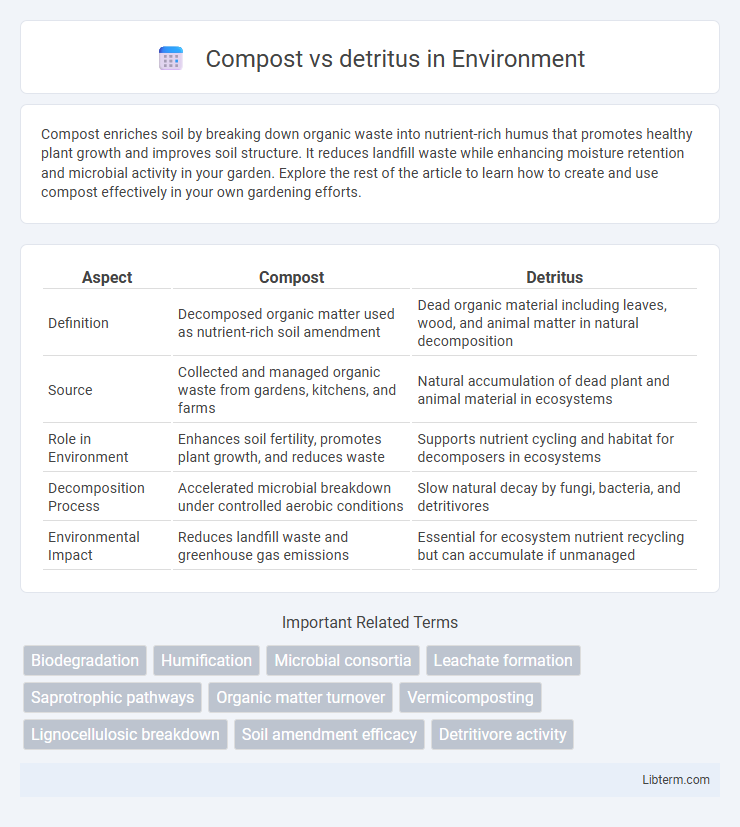Compost enriches soil by breaking down organic waste into nutrient-rich humus that promotes healthy plant growth and improves soil structure. It reduces landfill waste while enhancing moisture retention and microbial activity in your garden. Explore the rest of the article to learn how to create and use compost effectively in your own gardening efforts.
Table of Comparison
| Aspect | Compost | Detritus |
|---|---|---|
| Definition | Decomposed organic matter used as nutrient-rich soil amendment | Dead organic material including leaves, wood, and animal matter in natural decomposition |
| Source | Collected and managed organic waste from gardens, kitchens, and farms | Natural accumulation of dead plant and animal material in ecosystems |
| Role in Environment | Enhances soil fertility, promotes plant growth, and reduces waste | Supports nutrient cycling and habitat for decomposers in ecosystems |
| Decomposition Process | Accelerated microbial breakdown under controlled aerobic conditions | Slow natural decay by fungi, bacteria, and detritivores |
| Environmental Impact | Reduces landfill waste and greenhouse gas emissions | Essential for ecosystem nutrient recycling but can accumulate if unmanaged |
Introduction to Compost and Detritus
Compost is a nutrient-rich organic material created through the controlled decomposition of plant and food waste, enhancing soil health and fertility. Detritus refers to dead organic matter, including fallen leaves, dead animals, and microorganisms, which naturally decomposes in ecosystems to recycle nutrients. Both play crucial roles in nutrient cycling, but compost is a managed product designed to accelerate the breakdown process for agricultural and gardening use.
Defining Compost: Composition and Process
Compost consists of decomposed organic matter primarily derived from plant-based materials such as food scraps, yard waste, and manure, undergoing aerobic decomposition facilitated by microorganisms like bacteria and fungi. The process involves controlled conditions of moisture, temperature, and oxygen, converting raw organic waste into nutrient-rich humus that enhances soil fertility and structure. Compost's balanced carbon-to-nitrogen ratio (typically between 25:1 and 30:1) is critical for efficient microbial activity and organic matter breakdown, distinguishing it from untreated detritus.
Understanding Detritus: Nature’s Debris
Detritus consists of decomposing organic matter such as fallen leaves, dead plants, and animal remains that form the foundation of nutrient cycling in ecosystems. It supports a diverse community of microorganisms, fungi, and detritivores that break down complex materials into simpler compounds, enriching the soil naturally. Unlike compost, which is a managed and accelerated process of organic matter decomposition, detritus accumulates and decomposes in situ, reflecting the natural decay dynamics of ecosystems.
Sources of Compost vs Detritus
Compost primarily originates from organic waste such as kitchen scraps, garden clippings, and manure, which undergo controlled aerobic decomposition to produce nutrient-rich humus. Detritus consists of dead plant and animal matter found naturally in ecosystems like forest floors, wetlands, and aquatic environments, decomposing through microbial and invertebrate activity. The key distinction lies in compost being intentionally created from specific organic inputs, while detritus accumulates passively as part of natural ecological cycles.
Biological Roles in Ecosystem
Compost serves as a nutrient-rich organic amendment that accelerates microbial activity, enhancing soil fertility and promoting plant growth in ecosystems. Detritus, comprising dead organic matter such as fallen leaves and animal waste, acts as a primary energy source for decomposers like fungi and bacteria, facilitating nutrient cycling and organic matter breakdown. Both compost and detritus underpin ecosystem sustainability by supporting biodiversity, maintaining soil structure, and enabling the transfer of essential nutrients through trophic levels.
Decomposition Processes Compared
Compost and detritus both undergo decomposition, but compost is a managed process where microorganisms break down organic matter under controlled aerobic conditions, resulting in nutrient-rich humus. In contrast, detritus decomposition occurs naturally in ecosystems through a combination of physical, chemical, and biological mechanisms involving fungi, bacteria, and detritivores, often under varying oxygen levels. The controlled environment of composting accelerates decomposition rates and enhances nutrient cycling compared to the slower, less regulated breakdown of detritus in nature.
Environmental Impact and Benefits
Compost enhances soil health by promoting nutrient-rich organic matter, reducing landfill waste, and decreasing methane emissions compared to detritus, which often decomposes inefficiently and releases greenhouse gases. Utilizing compost supports sustainable agriculture by improving water retention and fostering beneficial microbial activity, whereas detritus accumulation can lead to nutrient imbalances and habitat disruption. Effective composting transforms organic waste into a valuable resource, significantly lowering environmental impact relative to unmanaged detritus decomposition.
Usage in Agriculture and Gardening
Compost enriches soil with stabilized organic matter, enhancing nutrient availability and soil structure, which boosts plant growth and microbial activity in agriculture and gardening. Detritus, composed of partially decomposed organic material, serves as a natural mulch and habitat for decomposers but offers slower nutrient release compared to compost. Utilizing compost accelerates soil fertility improvement, whereas detritus supports biodiversity and gradual nutrient cycling in cultivation systems.
Compost and Detritus in Waste Management
Compost and detritus play distinct roles in waste management, with compost representing the controlled aerobic decomposition of organic waste into nutrient-rich soil amendments, while detritus refers to the accumulation of dead organic matter in natural ecosystems. Efficient composting reduces landfill reliance by recycling kitchen scraps, garden waste, and other biodegradable materials into valuable humus, enhancing soil health and carbon sequestration. Detritus, although part of natural nutrient cycles, requires management in urban waste contexts to prevent environmental pollution and promote sustainable organic waste processing.
Choosing Between Compost and Detritus
Choosing between compost and detritus depends on the specific needs of your soil and plants, with compost offering a nutrient-rich, humus-like amendment that improves soil structure and fertility. Detritus, consisting of decomposing organic matter, primarily enhances soil microbial activity and moisture retention but may lack the concentrated nutrient profile found in compost. Gardeners aiming for rapid nutrient supply and improved soil texture should opt for compost, while those focusing on long-term soil ecosystem health might prefer detritus.
Compost Infographic

 libterm.com
libterm.com